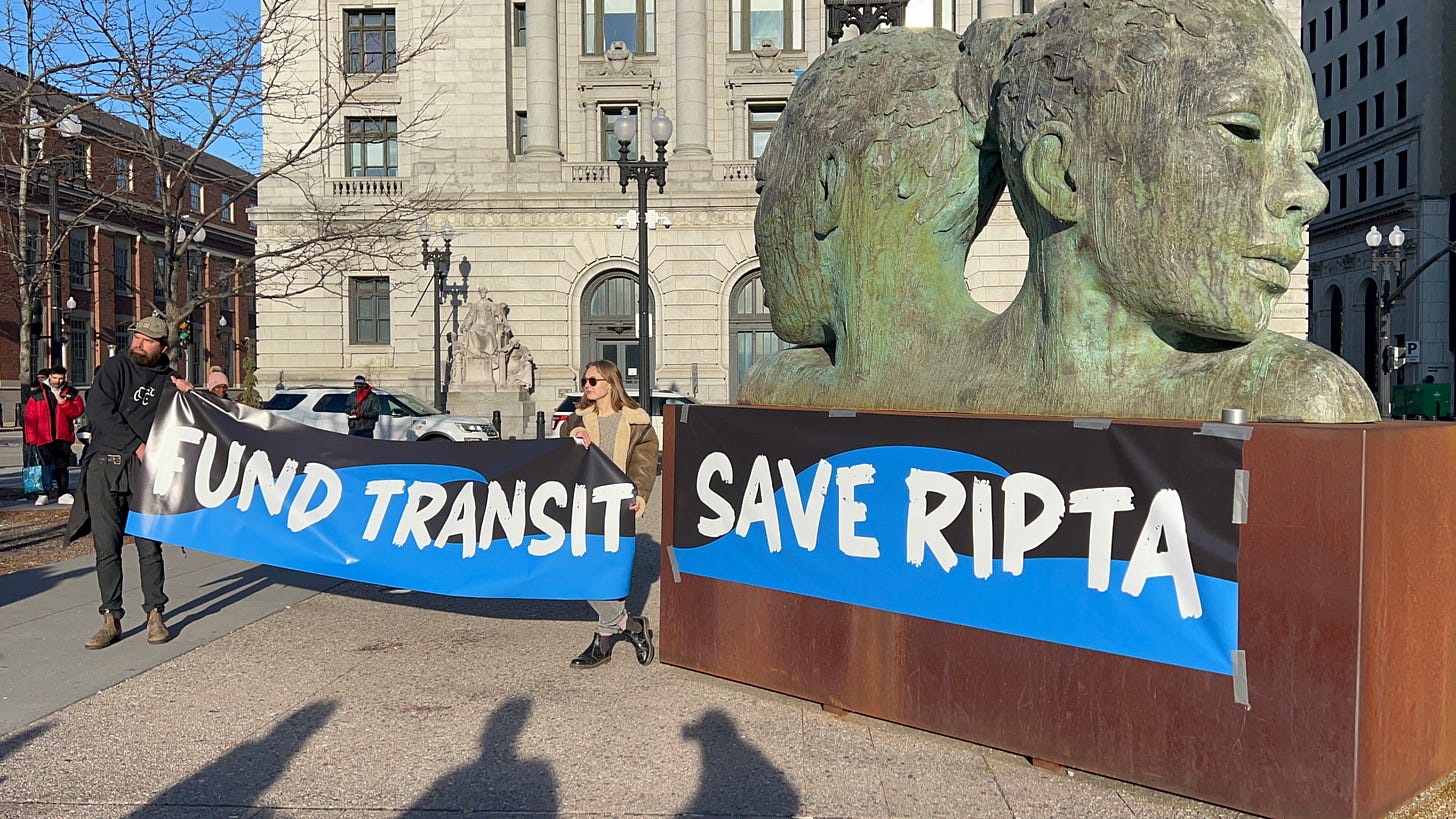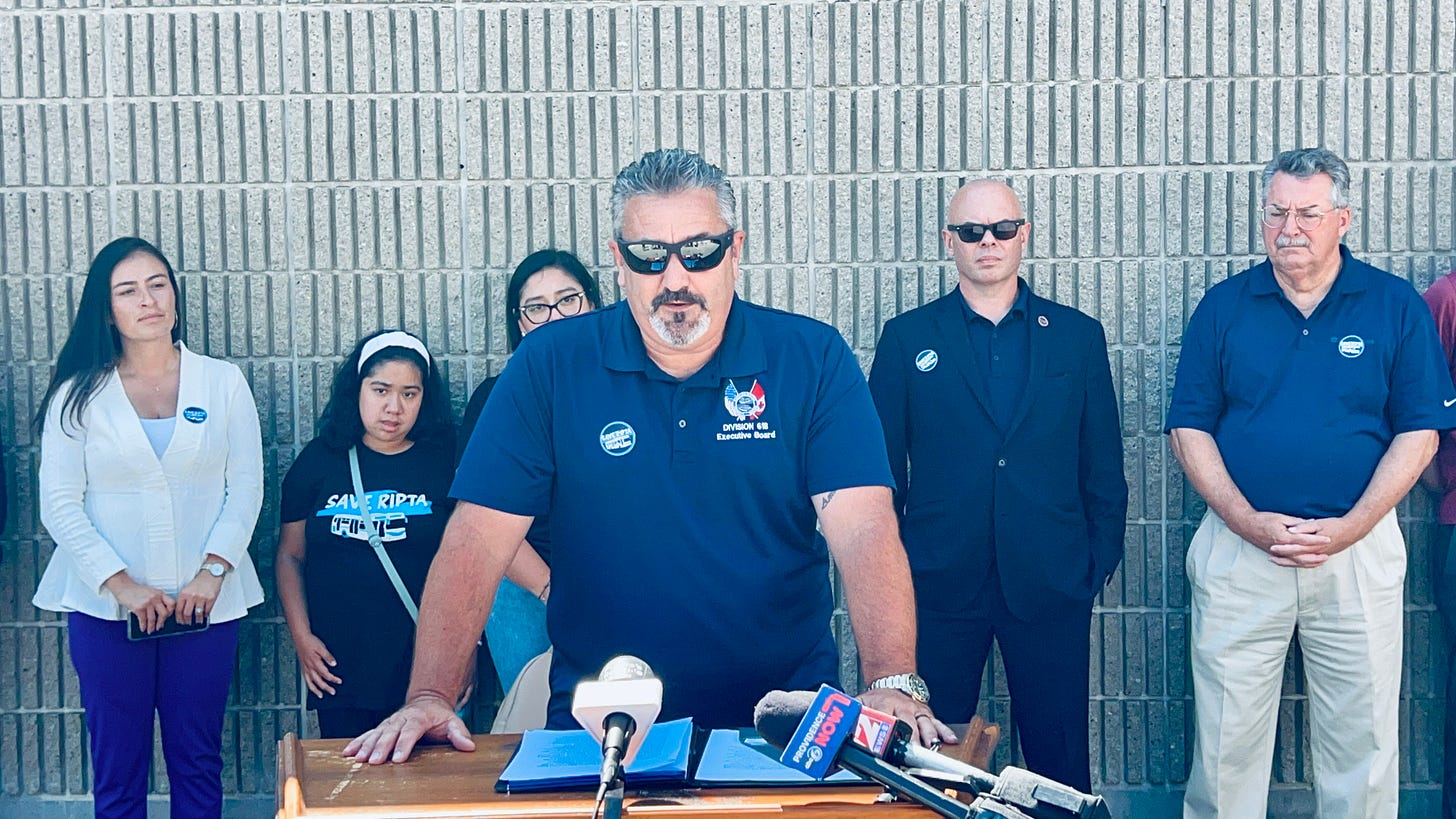Save RIPTA Coalition addresses devastating bus service cuts; Proposes alternatives
"...you’re raising taxes on working-class Rhode Islanders by asking them to shoulder the burden through job cuts and reduced services," said RI AFL-CIO President Patrick Crowley.
A coalition of community organizations, transit riders, bus drivers, and legislators gathered outside the Amalgamated Transit Union Local 618 Hall in Providence to speak out against the proposed cuts to RIPTA Service and how this “devastating” loss of service will affect all Rhode Islanders.
“We heard back in February, when RIPTA held a series on service cuts, how devastating it was going to be for everyday bus riders to get to work and school, and now we’re back, about a year and a half later, and the cuts before us, forced by a $10 million budget deficit, are going to affect 58 out of RIPTA’s 63 routes starting on September 13,” said Liza Burkin, Board President of the Providence Streets Coalition serving as the emcee of the press conference.
“There is still time to act and demand that they take action to find temporary funding so RIPTA can avert these cuts,” continued Burkin. “Make no mistake: If Governor Daniel McKee and our state leaders don’t act and these cuts go through, workers will lose their jobs. Students will not get to class. Older adults cannot get to the doctor or get groceries. Immigrants and new refugees will not be able to join the economy and start a new life. More people will be forced to spend more of their scarce income on Ubers and Lyfts, walk or bike long distances on dangerous roads, or be trapped at home and not go to the places they would go. This will strain systems like unemployment, emergency medical services, food pantries, and our agencies that serve the unhoused.
“This will not make Rhode Island an attractive place for young professionals to live or large employers to set up shop.” - Liza Burkin
“We all know where these service cuts are going to lead,” said Walter Melillo, President and Business Agent of Local 618/618A. “They’re going to lead to job losses, which directly affect the quality of the service provided by our hardworking union. members. Reduced service will result in overcrowded buses and safety and health concerns for riders and our members. Furthermore, these changes will impact the community’s access to essential transportation for everyday needs."
“While service cuts seem like a short-term solution for budget shortfalls, the long-term costs, in terms of economic damage, social impact, and difficulty rebuilding service, are far greater.” - Walter Melillo
“This is going to cause great pain,” noted State Senator Mark McKenney, “and who will be on the receiving end of that pain? The most vulnerable folks in our state.
“We have budget difficulties, we always do, but in my view, we should put more money into public transit, not cut it.
“I am tired of hearing that RIPTA could be run better. The study just done is confirming what was already known: There’s no entity known to man that someone couldn’t criticize for lack of efficiency or claim could be run better, but the fact is that RIPTA is run pretty darn efficiently, similar to comparable agencies.”
“I think back to a year or so ago when, at the last minute, Citizens Bank needed some funding. We came up with that money. We ought to be able to come up with funding here.” - Rhode Island State Senator Mark McKenney.
“This is not about RIPTA or how RIPTA is run,” added Burkin. “This is about a changing world and financial structure, and Rhode Island, again, being behind the curve. Some states, like New York, Pennsylvania, and Massachusetts, have found new sustainable long-term funding sources for their public agencies. Others, like Illinois and Pennsylvania, are still on the fence and facing the same kinds of cuts we are.
“It’s up to Governor McKee and our state leaders to decide: Which side do we want to be on? Do we want to be a forward-thinking state that will decarbonize our transportation and provide a system that young people, older folks, and young families want to ride, or will we let it die?”
“We’re on a path to letting it die.” - Liza Burkin
“To continue to have a thriving state, we need to fund RIPTA,” said Representative Karen Alzate (Democrat, District 60, Pawtucket, Central Falls). “I know the question on everybody’s mind is: How do we do that?
“I have been fighting for legislation to increase taxes on the 1% in Rhode Island. It is time for them to contribute to our beautiful state. We cannot allow them to continue to come into our state and say they are investing when they’re the ones who can pay for this. They’re the ones who will benefit if we have a thriving economy.”
“I’m here to remind our state leaders that a robust public transit system is necessary to reach our climate mandates and mitigate the climate crisis’s harm for generations to come,” said Emily Koo, policy advocate for the climate and energy nonprofit Acadia Center. “As a mom, I’m worried about the heat, flooding, and air quality that my son will face 15 years from now when he’ll be about driving age. But maybe he’ll take the bus instead. Fifteen years beyond that, he may consider starting a family. If these cuts stand, it will only become harder to rebuild our beleaguered transit system and reduce emissions from how we get around our state. I urge our leaders to fund RIPTA to have a safe, healthy, and livable climate for our children.”
"I’m a rider. My bus is the 92, and I have no car. I own zero cars,” said Valerie Reishuk, after reading the statement from the Rhode Island Transit Riders1. "We are cool people. We are awesome people.”
Reishuk continued:
“Riders are cool because they’re sitting on a bus with 39 other passengers, reducing congestion on the roads and highways. We have spoken about how riders have the smallest carbon footprints of anybody in our state, including my friends who have their bikes and put them on the front rack of those buses. We have these tiny carbon footprints.
“Finally, riders contribute because they pay a fare when they get on the bus, yet riders are often stereotyped as losers who ride the loser cruiser. It’s unfair and wrong, and we must change that stereotype.”
Reishuk noted the existential precarity of the people who use RIPTA for transportation:
“Riders have been impacted the most by this constant cycle of wondering if the funding will come. How can you sit at your dining room table and set a budget for your family if you’re not sure there will be a RIPTA or a bus for you? This cycle of not knowing and then having these hearings where we all have to go and say our sad story - mine is that I am a senior citizen and I wear a disability bracelet - we all have to go and say that.
“Then, of course, there’s usually a rescue period where funding is found. The cycle needs to stop. It’s not necessary. Let’s fund transit - period.”
“Let’s not mince words,” said Patrick Crowley, President of the Rhode Island AFL-CIO, “service cuts and job losses at RIPTA are a tax on the working class. Workers cannot be expected to shoulder the burden alone to ensure public transportation works in this state. It’s time for our friends in the business sector to join with workers and riders to support a RIPTA that works for Rhode Islanders.”
Crowley continued:
“Let me be clear, this service cut is a form of a tax increase on working-class Rhode Islanders. That’s the only way to see it, because by expecting working people and the people who rely on the RIPTA service to get to work, the hospital, and places they need to be, you’re raising taxes on working-class Rhode Islanders by asking them to shoulder the burden through job cuts and reduced services.
“You are raising taxes - you’re just choosing how to do it and who bears the brunt.
“Quite frankly, Rhode Islanders are sick and tired of having working-class people bear the brunt of budgetary shortfalls. But like you’ve heard, there are things that we could do. There’s an opportunity before these cuts are put forward to save the day. We have time. I’m asking all of our elected leaders, my colleagues that are here with us today, and those who couldn’t be here: Let’s find those solutions. Let’s forestall these changes.
“As a RIPTA board member, I’m willing to work with anyone, whether an elected official or someone in the business community, to ensure that RIPTA has the resources it needs. But let me be clear: The days of balancing the budget on working Rhode Islanders should be done. We will fight to ensure that RIPTA has the services and funding it needs and that working-class Rhode Islanders aren’t left with the responsibility of doing things that everyone else should have been doing in the first place.”
“These cuts are the largest proposed in RIPTA’s history. We ask Governor McKee if he wants that stain on your leadership,” said Burkin. “There is still time to act before September 13. We call on everyone and anyone to work together to find $10 million to plug this hole.”
“These cuts are devastating and will cause job losses and cut off health and social services access,” wrote Amy Joy Glidden, Chair of the Rhode Island Transit Riders. “Over 40,000 riders will be impacted. We also expect to see lost jobs in every sector of the economy. When bus hours are shortened, people can’t get to restaurant jobs at night. That first bus that serves medical workers will be cut. Weekend cuts mean people can’t get to religious services. And rural service will be gutted. But we don’t have to let this happen. There is another choice. Governor McKee can do the right thing for our riders, businesses, economy, and climate, and find some state funds to keep Rhode Island moving forward.”




I am with Liza, Amy, Walter, Emily, Karen, Patrick, Valerie and Sen McKenney, and many other smart people who know the RIPTA service cuts are wrong and will hurt many people. Step up McKee and do the right thing!
It is time to tax the 1%. Cutting bus service will be devastating to the life of Rhode Islanders and the economy. It is equal in horror to cutting healthcare. The Governor and the Speaker of the House should be already maing plans to get the legislatiure back into session right NOW to tax the rich. and fund what Rhode Islanders need. At a minimum the taxes on the 1% should take back everything they were going to save in federal taxes under the stupid gigantic evil bill that the president and his minions just foisted on us. And since taxes on the rich nationally are already too low, as they are in RI, an even higher percentage is warranted, as there is much that will be unfunded nationally that we shall need to make up here.